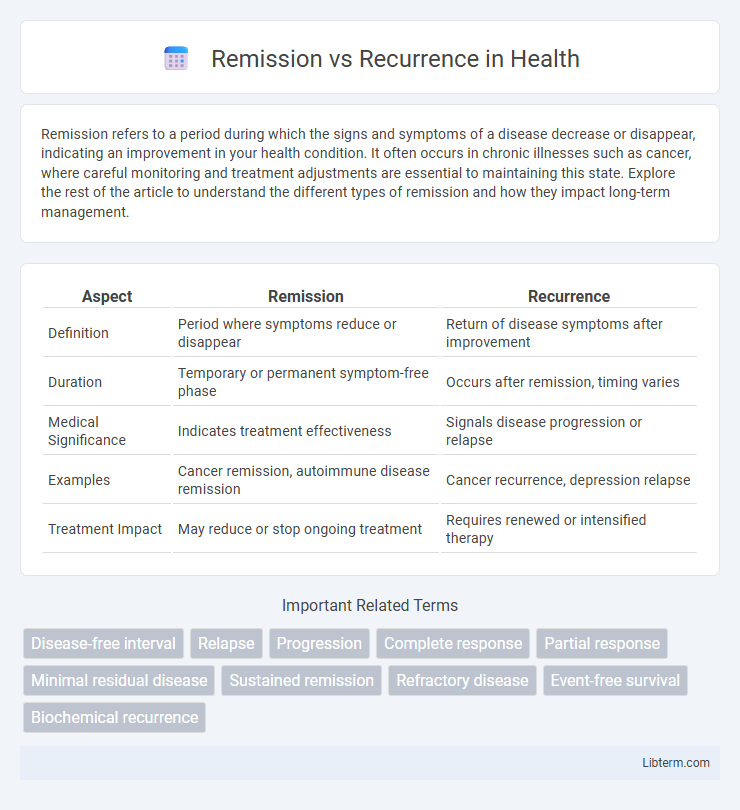Remission refers to a period during which the signs and symptoms of a disease decrease or disappear, indicating an improvement in your health condition. It often occurs in chronic illnesses such as cancer, where careful monitoring and treatment adjustments are essential to maintaining this state. Explore the rest of the article to understand the different types of remission and how they impact long-term management.
Table of Comparison
| Aspect | Remission | Recurrence |
|---|---|---|
| Definition | Period where symptoms reduce or disappear | Return of disease symptoms after improvement |
| Duration | Temporary or permanent symptom-free phase | Occurs after remission, timing varies |
| Medical Significance | Indicates treatment effectiveness | Signals disease progression or relapse |
| Examples | Cancer remission, autoimmune disease remission | Cancer recurrence, depression relapse |
| Treatment Impact | May reduce or stop ongoing treatment | Requires renewed or intensified therapy |
Understanding Remission: Definition and Criteria
Remission refers to the reduction or disappearance of the signs and symptoms of a disease, indicating a period during which the disease is under control or inactive. Clinical remission is defined by specific criteria, including the absence of detectable disease activity through physical exams, laboratory tests, and imaging studies. Achieving remission does not guarantee cure, but it serves as a key milestone for disease management and treatment effectiveness.
What is Recurrence? Key Characteristics Explained
Recurrence refers to the return of disease symptoms or cancer after a period of remission, indicating that the condition was not entirely eradicated. Key characteristics of recurrence include its timing, which can be local, regional, or distant, and its detection through medical imaging, biomarkers, or clinical symptoms. Understanding the distinction between remission, where symptoms temporarily subside, and recurrence is critical for ongoing patient monitoring and treatment planning.
Causes and Triggers: Why Do Diseases Recur?
Remission refers to a period when symptoms of a disease significantly decrease or disappear, whereas recurrence is the return of disease symptoms after a remission phase. Causes of disease recurrence often include incomplete treatment, immune system impairment, persistent infection, or genetic factors that allow dormant cells to reactivate. Triggers such as stress, lifestyle changes, environmental exposures, and coexisting illnesses can provoke relapse by disrupting the delicate balance needed to maintain remission.
Types of Remission: Complete vs Partial
Complete remission signifies the total disappearance of all signs and symptoms of a disease, often indicating no detectable cancer cells in diagnostic tests. Partial remission refers to a significant reduction, but not elimination, of disease manifestations, with cancer cells still detectable though reduced in size or number. Understanding the differences between complete and partial remission is crucial for tailoring treatment strategies and monitoring potential recurrence in patients.
How Recurrence Differs From Relapse
Recurrence refers to the return of cancer after a period of remission, indicating that the disease was undetectable for a time before reappearing. Relapse generally implies the return of symptoms or disease activity in chronic conditions without complete remission. Recurrence is specifically used in oncology to describe cancer's return, while relapse applies broadly to various diseases, emphasizing differences in terminology and disease trajectory.
Risk Factors for Recurrence After Remission
Risk factors for recurrence after remission include incomplete treatment, genetic predispositions, and underlying chronic conditions that impair immune response. Lifestyle factors such as smoking, poor diet, and stress also significantly contribute to higher recurrence rates. Monitoring biomarkers and early intervention are critical to managing these risk factors effectively.
Monitoring and Detecting Recurrence Early
Regular monitoring through imaging, blood tests, and clinical evaluations is essential for detecting cancer recurrence early in patients who are in remission. Biomarkers and advanced diagnostic tools improve the accuracy of surveillance, enabling timely intervention and better outcomes. Early detection of recurrence allows for prompt treatment adjustments, potentially increasing survival rates and quality of life.
Treatment Strategies During Remission and Recurrence
Treatment strategies during remission focus on maintenance therapy, regular monitoring, and lifestyle modifications to prevent disease flare-ups and prolong symptom-free periods. In contrast, recurrence requires aggressive intervention, including reintroduction or intensification of medications, targeted therapies, and possibly combination treatments to control symptoms and halt disease progression. Personalized treatment plans based on patient response and disease biomarkers enhance both remission maintenance and effective management of recurrence.
Patient Stories: Coping With Remission and Recurrence
Patients navigating remission often share stories of hope and resilience, emphasizing lifestyle changes and emotional support as key factors in maintaining well-being. Those experiencing recurrence frequently discuss the challenges of uncertainty and the importance of strong healthcare partnerships for timely treatment adjustments. Personal narratives highlight coping strategies such as mindfulness, community support groups, and tailored rehabilitation programs to manage both physical and psychological impacts.
Prevention Tips for Reducing Recurrence Risks
Maintaining a healthy lifestyle with balanced nutrition, regular exercise, and stress management plays a crucial role in reducing the risk of cancer recurrence during remission. Consistent medical follow-ups, adherence to prescribed treatments, and avoiding known cancer risk factors such as tobacco and excessive alcohol significantly help in prevention. Monitoring biomarkers and early detection through regular screenings enable timely intervention to minimize recurrence risks.
Remission Infographic

 libterm.com
libterm.com